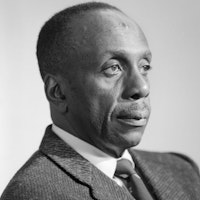Don’t ask yourself what the world needs. Ask yourself what makes you come alive and then go do that…
Don’t ask yourself what the world needs. Ask yourself what makes you come alive and then go do that…
Howard Thurman

What Makes You Come Alive
Topic: Courage, Integrity, & Purpose
Don’t ask yourself what the world needs. Ask yourself what makes you come alive and then go do that. Because what the world needs is people who have come alive.
Howard Thurman, born on November 18, 1899, in Daytona Beach, Florida, emerged as a highly influential figure in American history. As a theologian, philosopher, educator, and civil rights leader, Thurman’s intellectual pursuits underscored the intersection of spirituality and the fight for social justice. Growing up in a segregated society, he became a beacon of enlightenment and understanding, using religion and spirituality as powerful tools to combat racial discrimination and social injustice. His profound impact on American society is evident through his extensive writings and teachings, which continue to inspire.
Thurman’s influence extended notably to Dr. Martin Luther King Jr., whom he mentored. His book, Jesus and the Disinherited, profoundly shaped King’s understanding of nonviolent resistance, which became a cornerstone of the Civil Rights Movement. In addition to his role as a mentor, Thurman achieved a historic milestone by becoming the first African-American dean of a predominantly white university, serving as the dean of Marsh Chapel at Boston University. His guidance and teachings helped foster a deeper understanding of the potential role of Christian churches in social justice efforts, which significantly influenced the direction and spirit of the Civil Rights Movement.
Even after King left Boston University, Thurman continued to support him and other civil rights leaders, emphasizing the importance of maintaining spiritual roots amidst their social justice efforts. He urged them to remain vigilant in their spiritual journeys through meditation, prayer, singing, celebration, and worship. Thurman believed that true social change could only come through personal transformation and adherence to spiritual disciplines. Howard Thurman passed away on April 10, 1981, in Daytona Beach, Florida, leaving behind a substantial and impactful legacy that continues to inspire individuals in the fields of civil rights, theology, and education.
Thurman, Howard. “Don’t ask yourself what the world needs. Ask yourself what makes you come alive and then go do that. Because what the world needs is people who have come alive.” Violence Unveiled: Humanity at the Crossroads, by Gil Bailie, Crossroad, 1996, p. xv.

Howard Thurman
Theme: Moral Courage

About This Howard Thurman Quotation [Commentary]
Howard Thurman’s guidance—“Don’t ask yourself what the world needs. Ask yourself what makes you come alive and then go do that”—turns the usual question of service on its head. Rather than beginning with outward demands, Thurman invites us to return to what stirs life within. His closing line makes the point plain: “Because what the world needs is people who have come alive.” The focus is not on abandoning care for the world, but on recognizing that the most vital contribution flows from inner vitality. The world’s needs are real, but they are best met by those who act from what is whole and awake within them.
This orientation calls for moral courage. To “come alive” is not a fleeting feeling—it’s a commitment to follow what is inwardly true, even when that path leads away from convention. The instruction to “go do that” asks more than impulse; it asks integrity. In this light, Thurman is not encouraging indulgence, but a kind of clarity: that life’s real work begins when we act from our own aliveness. The courage to follow what makes us come alive is often quiet, requiring trust in one’s deeper direction, especially when it conflicts with expectations or approval.
Elsewhere in Meditations of the Heart, Howard Thurman speaks of seeking a life “under the influence of… the fruits of the inner life.” This inner ground is not passive; it leads to action. When he says, “go do that,” he speaks to a rooted way of living, not a reactive one. The repetition of “come alive” is deliberate—it emphasizes that aliveness is the necessary condition for meaningful engagement. Those who follow this way do not turn from the world; they meet it with presence, clarity, and the strength of their own awakened life.
A Couple of Additional Quotations From Howard Thurman
Verification of the Citation via Quote Investigator
Quote Investigator: In 1995 teacher Gil Bailie published “Violence Unveiled: Humanity at the Crossroads”. Bailie stated that he heard the quotation under examination from Howard Thurman. [1997 (1995 Copyright), Violence Unveiled: Humanity at the Crossroads by Gil Bailie, Section: In Gratitude by Gil Bailie, Date on Section: August 1994, Start Page xv, Quote Page xv, A Crossroad Book: The Crossroad Publishing Company, New York.]
The text above appeared in a section titled “In Gratitude” dated August 1994. Bailie indicated that he heard the remark from Thurman twenty years in the past, i.e., around 1974. Howard Thurman died in 1981.
Resources
Related Quotes
Copyright © 2017 – 2026 LuminaryQuotes.com About Us